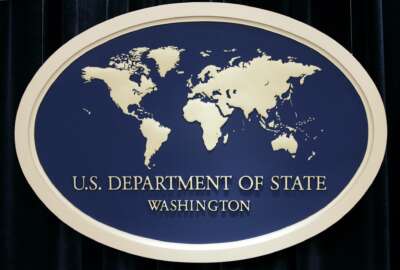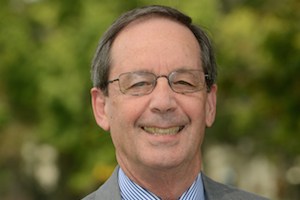
Good-government groups suggest ways to improve federal workforce under Biden
A coalition of good-government groups has focused on the Trump administration plan for policy-related career jobs known as Schedule F. They feel it represents a...
Best listening experience is on Chrome, Firefox or Safari. Subscribe to Federal Drive’s daily audio interviews on Apple Podcasts or PodcastOne.
A coalition of good-government groups has focused on the Trump administration plan for policy-related career jobs known as Schedule F. They feel it represents a general alienation of the federal workforce. For a few ideas on how the incoming Biden administration can succeed with the workforce, American University professor Bob Tobias spoke to Federal Drive with Tom Temin.
Interview transcript:
Tom Temin: And Bob, there have been some controversial moves during the last administration or the about-to-be-outgoing administration but let’s focus on what’s coming next. Let’s presume that there is some alienation among the federal workforce. What do you think Joe Biden should do to start restoring that sense of faith back and forth?
Bob Tobias: Well, you’re right, Tom, federal employees have been reduced in size without any reduction in the scope of their work. They’ve been criticized, they’ve been shut down. And they most recently [were] threatened with Schedule F. So I think President Biden needs to restore a relationship between the president and federal employees, that will energize them to do the work of the public. And I think that he should assume that he is the – something akin to the chief executive officer of the executive branch and responsible for effectively and efficiently implementing public policy, and such, treat the employees of the executive branch as people he needs to achieve his goals and objectives.
Tom Temin: And you have the theme too, and we’ve spoken about this before, in the sense of taking responsibility for when things go well, or when they don’t go well, knowing where the buck stops.
Bob Tobias: I think that’s critically important because presidents in the past have sought to distance themselves from failures or the inevitable failures in the executive branch. But I believe a president ought to hold himself accountable for both the failures and also take credit for the successes, which are many and often ignored.
Tom Temin: Yes, because during the Obama administration, there were some great things happened, some not so great things happened. I remember the scandal with the IRS and the way certain groups felt they were treated under nonprofit provisions of the tax code. There was the Benghazi situation, there was the rollout of the first iteration of the website for the Affordable Care Act. And so all administrations have these issues. I guess it’s a question of how the president reacts to them when many times what happened was the work of the federal workforce.
Bob Tobias: No question about it. With a 2.2 million workforce and the complex problems that are faced by the federal government today, there are going to be failures. It’s inevitable. So the question is, does the president say yes, there are failures? Like, yes, there are successes, and acknowledge those successes. Put some social capital in the bank by saying yes, here are the successes, here’s what’s happening in this agency or that agency. And I think the president ought to directly engage with federal employees, maybe through a regular video, and certainly visits to agencies and talking to federal employees. The political appointees look to the president to set the tone with respect to the relationship with federal employees. And I think President Biden needs to set a positive, energizing tone.
Tom Temin: And when you mentioned the political appointees, that’s an important point too – the types of people that you bring into the agencies. We’ve seen both types over the years, those that come in, they just want to get their agenda done and roll roughshod over whoever’s in the way and whoever’s in place there. Then you have those that come in with an equally ambitious agenda, but try to enlist the workforce in getting it done.
Bob Tobias: We have seen some political appointees who come in and seek to have their policies implemented no matter what. And oftentimes they can get a regulation issued that is – fulfills their policy objective, but because they haven’t engaged the federal workforce, it does not get effectively implemented. Creating public policy is the beginning, not the end. And leaders need to understand that it’s not only public policy creation, but public policy implementation.
Tom Temin: Yeah, it really has to be almost baked in as a way of approaching federal service when the mission is so clear and so inculcated, that nobody has any question about what they’re trying to do to fulfill that mission.
Bob Tobias: That’s correct. And, you know, if a person is a CEO of a private sector organization, there’s a recognition that I can declare whatever I want, but it often doesn’t get implemented unless I engage the workforce in the implementation effort. And that’s what I think that President Biden and his political appointees need to do.
Tom Temin: We’re speaking with Bob Tobias. He’s a professor at the key executive Leadership Program at American University, and has watched these things for many, many years. And that idea that you mentioned a moment ago about the president meeting with federal groups, such as the Senior Executives Association, that’s a difficult thing in terms of the time required and the logistics and the schedule and so forth. I remember, it took a while for President Obama to visit with the SEA in particular. I think George H.W. Bush met very early with the federal workforce. And people still talk about that now, some 30 – whatever it was, 30 years later. What’s your feeling on on that point?
Bob Tobias: Federal employees, I believe, want to be connected with their leader, and George H.W. Bush did organize a meeting with the Senior Executive Service, all of them at Constitution Hall. And as you suggest, they’re still talking about it. I want to matter to my leader, and my leader has to exhibit concern for me, a follower. It just has to be accepted as true because it is true. I have to matter as a follower. And the president has to tell me I matter. And when the president does, I’m energized by that, and the public benefits from my additional energy.
Tom Temin: And what about those labor management forums? I don’t necessarily like the word labor – I mean, I like the word employee management, or staff and management or line employees and management – forums to figure out ways to solve things. Those disappear under Republican administrations, they reappear under Democratic administrations. They disappeared under the Trump administration, we presumed Joe Biden will bring them back. But do you deal with, I mean, who do you deal with as leadership? The unions represent the large number of employees in certain agencies, but you’re not really dealing with the union as an institution, you really want to deal directly with the employees. How do you navigate that one?
Bob Tobias: Well, the fact is that, under the law, employees can select the union as their representative. And the unions who have effectively collaborated with agency leaders have included and involved employees through the union to create more efficiency and more effectiveness. And my hope is that the president when he reissues, what Clinton started Obama enhanced, is to focus on the collaboration that’s necessary to increase the productivity of the workforce. And when that happens, those folks who are in the workforce clamor to be involved. They’re involved through their union. And there are many, many examples of significant successes through that involvement.
Tom Temin: And a final question: Over the years, I’ve seen some instances where long-serving career employees become politically – they convert to a political appointed job, moving up a notch, say out of the Senior Executive Service into Schedule C, or even higher than that on some occasions. And they really get a lot of kudos from their, what were formerly regular coworkers, because it signals that you can rise through the career ranks. And should you choose to leave career ranks and become political, I think that can send a good message if done carefully. What’s your thought on it?
Bob Tobias: I agree, Tom, because there are an awful lot of jobs in the federal government, particularly that require specialized expertise and when that expertise is acknowledged, and supported through an appointment to a political position, it energizes others who want to have the same career path.
Tom Temin: Bob Tobias is a professor in the key Executive Leadership Program at American University. Thanks so much.
Bob Tobias: Thank you, Tom.
Tom Temin: We’ll post this interview at FederalNewsNetwork.com/FederalDrive. Subscribe to the Federal Drive at Apple Podcasts or wherever you get your shows.
Copyright © 2025 Federal News Network. All rights reserved. This website is not intended for users located within the European Economic Area.
Tom Temin is host of the Federal Drive and has been providing insight on federal technology and management issues for more than 30 years.
Follow @tteminWFED
Related Stories





